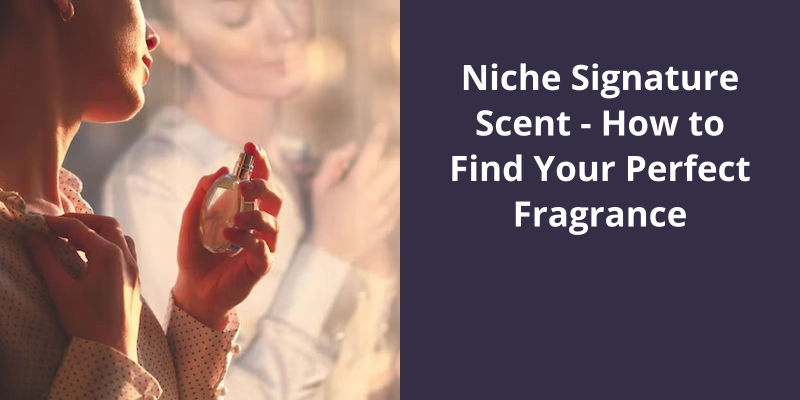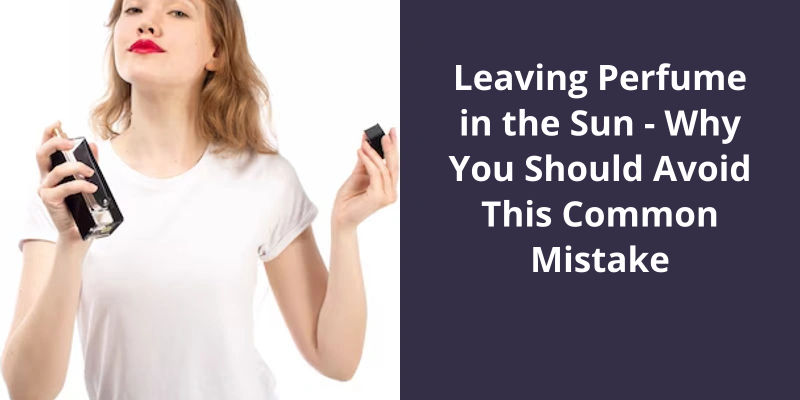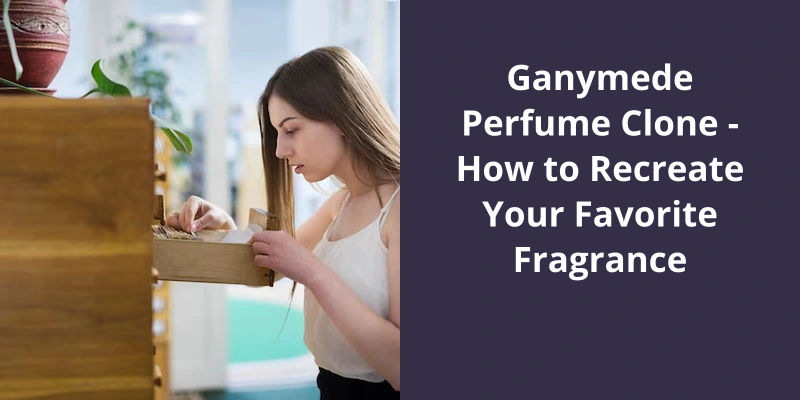If you leave a perfume bottle open, the perfume will likely weaken and lose its aroma over time due to evaporation. This is because perfumes have a high concentration of alcohol, which quickly evaporates if not properly sealed. Also, being exposed to air can introduce bacteria and affect the chemical composition of the perfume. This could alter its scent or even create a foul smell. Moreover, it can also cause the fragrance to oxidize, which may trigger its degradation. Therefore, to maintain the effectiveness and longevity of your perfume, it’s important to keep the bottle tightly closed when not in use.

Does Opening a Perfume Bottle Ruin It?
Many people have wondered if opening a perfume bottle ruins it. The truth is, there’s no clear answer to this question since the potency, longevity, and overall performance of a perfume after it’s opened can depend on various factors. However, one thing that’s true is that once you unseal a perfume bottle, youre exposing it to the air and the oxygen within it.
The effect of oxygen on perfume is tricky to comprehend as it can significantly alter the scent quality. Prolonged exposure to oxygen can cause the scent to weaken or become “off.”. This is why you might notice that a perfume smells different after it’s been open for a while.
It’s essential to know that the moment you open a perfume bottle and expose it to air, the clock starts ticking. Even if you don’t apply it, the evaporation process slowly begins, resulting in a more diluted scent. That means if you want to extend the lifespan of your perfume and preserve it’s fragrance, you must keep the bottle well-sealed when not in use.
Another factor that can influence a perfumes shelf life is light exposure. Light, particularly UV rays, can break down the scent molecules, changing the fragrances composition and weakening the overall performance. Therefore, you should store your perfume in a cool, dark place away from any direct sunlight. A consistently cool environment can also help preserve the scent for a more extended period.
Furthermore, proper storage of perfume is key to maintaining it’s quality. Many people often make the mistake of storing perfume in their bathroom, which isn’t ideal. Bathrooms can fluctuate in humidity, and exposure to moisture can cause the perfume to spoil quicker than it should.
How to Properly Apply Perfume to Maximize It’s Longevity and Potency
- Apply perfume after taking a shower or bath, while your skin is still moist
- Apply perfume on pulse points, such as the wrists, neck, and inside of elbows
- Avoid rubbing the perfume into your skin, as this can break down the fragrance molecules
- Apply perfume to your hair for longer-lasting fragrance
- Store perfume in a cool, dark place, away from heat and sunlight
- Avoid spraying perfume directly onto clothes or fabrics, as it can stain or damage them
- Layer perfume with matching scented body lotion or shower gel for a more intense and long-lasting fragrance
- Reapply perfume throughout the day, as needed
It’s no secret that a good perfume can make or break your day, but did you know that leaving it without a cap can cause some serious damage? As tempting as it may be to spray and go about your day, leaving your perfume bottle open can have some unintended consequences. So, before you leave your fragrance unattended, here’s what you need to know.
Is It Bad to Leave Perfume Without Cap?
When perfume is exposed to air and light, it begins to break down and lose it’s potency. This is due to the volatile compounds in the perfume reacting with the air and evaporating at different rates, causing the fragrance to change and become less effective over time. In addition, leaving the cap off can allow dirt and other contaminants to enter the bottle, further compromising the perfumes quality.
This is especially true if the bottle is tilted or knocked over accidentally. Additionally, perfume that evaporates too quickly can leave behind a cloying, overpowering scent that can be unpleasant for those around you.
If you do accidentally leave your perfume bottle uncapped, it’s important to take steps to mitigate the damage. First, make sure to reclose the bottle as soon as possible, to slow down the evaporation process and preserve the fragrance as much as possible. If the perfume has started to change in scent or become less potent, it might be time to toss it out and start fresh with a new bottle.
By taking a few extra seconds to reclose your perfume after use, youll be able to enjoy it’s beauty and aroma for much longer. And if youre ever in doubt about whether your perfume is still fresh and effective, don’t hesitate to consult a fragrance expert or check the manufacturers guidelines for information on storage and usage.
The Effects of Temperature and Humidity on Perfume
Perfume can be affected by temperature and humidity levels. Higher temperatures can cause the fragrance to evaporate more quickly, resulting in a shorter lifespan for the scent. Conversely, colder temperatures can cause the fragrance to remain in it’s bottle and not project as well. Humidity can also affect perfume, as too much moisture in the air can dilute the scent and make it less intense. Overall, storing perfume in cool, dry places can help preserve it’s quality and longevity.
Source: What happens if you don’t put the lid on a perfume for …
Understanding how perfume behaves can help you make the most of your favorite fragrances. Let’s look at some other factors that affect how perfume evaporates and how you can extend it’s shelf life.
Does Perfume Evaporate if Left Open?
When perfume is left open, it’s exposed to the air and the molecules begin to evaporate. As the perfume evaporates, it loses it’s potency and scent, eventually becoming weaker and weaker until the fragrance is no longer noticeable. It’s similar to leaving a cup of water out in the sun – eventually, the water will evaporate completely and the cup will be empty.
For example, the temperature of the room can have an impact on how quickly the scent dissipates. In warmer temperatures, the perfume molecules are more likely to evaporate quickly, while in cooler temperatures, they may linger in the air for longer.
Some perfumes are specifically designed to have a longer staying power, meaning that they’re less likely to evaporate quickly when left open. On the other hand, lighter, fresher scents are more prone to evaporating quickly, as they contain fewer and lighter molecules.
However, this isn’t necessarily true – while the scent may become weaker over time, it’s unlikely to become rancid or unpleasant. In fact, some perfumes can actually improve with age, as the ingredients mingle and mellow out over time.
To keep your perfume smelling fresh and potent for longer, it’s best to store it properly and avoid leaving it open for extended periods. Keep the bottle out of direct sunlight, as this can cause the perfume to break down and lose it’s scent. And, of course, always be sure to replace the cap tightly after use to prevent unnecessary evaporation.
The Evaporation Rates of Different Fragrance Families (Floral, Oriental, Woody, Etc.)
- Floral
- Oriental
- Woody
- Citrus
- Aquatic
- Aromatic
- Green
- Fruity
- Gourmand
- Chypre
- Leather
- Mossy
When Someone Opens a Bottle of Perfume in One Corner of a Room We Can Smell It From the Other Coronavirus?
As soon as the bottle is opened, the gas molecules start to spread out from a high to a low concentration area. This movement of gas particles is called diffusion. During diffusion, the gas particles move randomly and collide with each other, which eventually leads to the spreading of the scent throughout the room.
It’s interesting to note that the intensity of the perfume odor can vary based on the air circulation and the absorption capacity of the room. Similarly, if the room is highly absorbent, like a carpeted room, the scent will be less noticeable as the carpet fibers may trap some of the perfume particles, reducing their movement and concentration in the air.
In terms of coronavirus, the scent of perfume has no direct connection with the spread of the virus. However, the diffusion process and the role of air movement are crucial concepts to understand the spread of viruses in a closed space. As the coronavirus spreads through respiratory droplets, the air movement and ventilation of a room can significantly affect the concentration of these droplets, leading to a higher or lower risk of transmission.
While this may not be directly relevant to the transmission of coronavirus, understanding these concepts can help us evaluate the risks of virus spread in closed spaces and take necessary precautions to prevent transmission.
The Science of Diffusion and How It Affects the Spread of Other Substances in Closed Spaces.
Diffusion is the process by which molecules move from an area of high concentration to an area of low concentration. In closed spaces, this can affect the spread of other substances, such as gases. Understanding the science of diffusion is important when it comes to modeling the behavior of pollutants, infectious diseases, and other substances in confined environments.
Understanding the science behind why we can smell perfume when it’s opened can provide insight into other everyday occurrences and chemical reactions that take place around us. Diffusion is a fascinating phenomenon that plays a critical role in chemistry, and it’s the key factor that makes our nose able to detect when a bottle of perfume is opened nearby.
What Happens if a Bottle of Perfume Is Opened?
Diffusion is a fundamental principle of nature that describes the movement of molecules from a region of high concentration to a region of low concentration. This phenomenon occurs in all states of matter, including gases, liquids, and solids. In the case of perfume, the volatile organic compounds that make up the fragrance molecules are released into the surrounding air and they start to diffuse, filling the space with their scent.
The intensity and speed of this fragrance diffusion depend on a variety of factors, such as the temperature and humidity of the environment, the chemical composition of the perfume, and the amount of air circulation. For instance, if the room is cold and humid, the perfume diffusion may be slower, and the scent may not be as strong as it would be in a warmer and drier room. Similarly, if the perfume contains more volatile compounds, it will diffuse faster than a perfume with a lower concentration of those compounds.
Aside from the sensory experience of smelling a perfume, the diffusion of fragrance molecules also has practical implications for scent marketing, product placement, and personal hygiene. Fragrance companies use diffusion machines, diffuser sticks, and aerosol sprays to ensure that their scents reach the desired areas and target customers. Retail stores use diffusers to create a pleasant atmosphere and persuade shoppers to spend more time and money in their premises. Similarly, individuals use perfumes, colognes, and body sprays to enhance their personal scent and make a good impression on others.
However, it’s essential to note that perfume diffusion can also have negative consequences for some people, such as those with allergies, asthma, or chemical sensitivities. Perfumes contain a complex mixture of chemicals, some of which can trigger respiratory and skin reactions in sensitive individuals. For this reason, many public places, such as hospitals, schools, and workplaces, have fragrance-free policies to protect people from exposure to strong scents.
This process follows the principles of diffusion and is affected by various environmental and chemical factors. Whether you love or hate perfume’s scent, it’s fascinating to think about the science behind this olfactory experience.
The History and Cultural Significance of Perfume and Fragrances
- Perfumes have been used for thousands of years in many cultures for religious ceremonies, beauty rituals, and to mask unpleasant odors.
- The ancient Egyptians are often credited with inventing perfume and using it in religious ceremonies and as a symbol of power and status.
- In many Middle Eastern cultures, perfume has deep cultural significance and is often associated with hospitality, generosity, and social events.
- In Europe during the Renaissance, perfume was popular among the wealthy and was used to mask the unpleasant smells of the time.
- The development of modern perfumery in the 19th century led to the creation of many iconic fragrances that are still popular today, such as Chanel No. 5 and Shalimar.
- Celebrities and fashion designers often release their own fragrances as a way to extend their brand and reach a broader audience.
- Perfumes and fragrances continue to play an important role in our culture, with new scents and trends emerging every year.
Conclusion
In conclusion, leaving a perfume bottle open can have a significant impact on the longevity and quality of the fragrance. While it may be tempting to leave the bottle exposed in order to enjoy the aroma, doing so will only result in diminished scent and a less satisfying overall experience. To ensure that your perfume retains it’s full potency and aroma, it’s important to keep the bottle closed until the first spritz.





